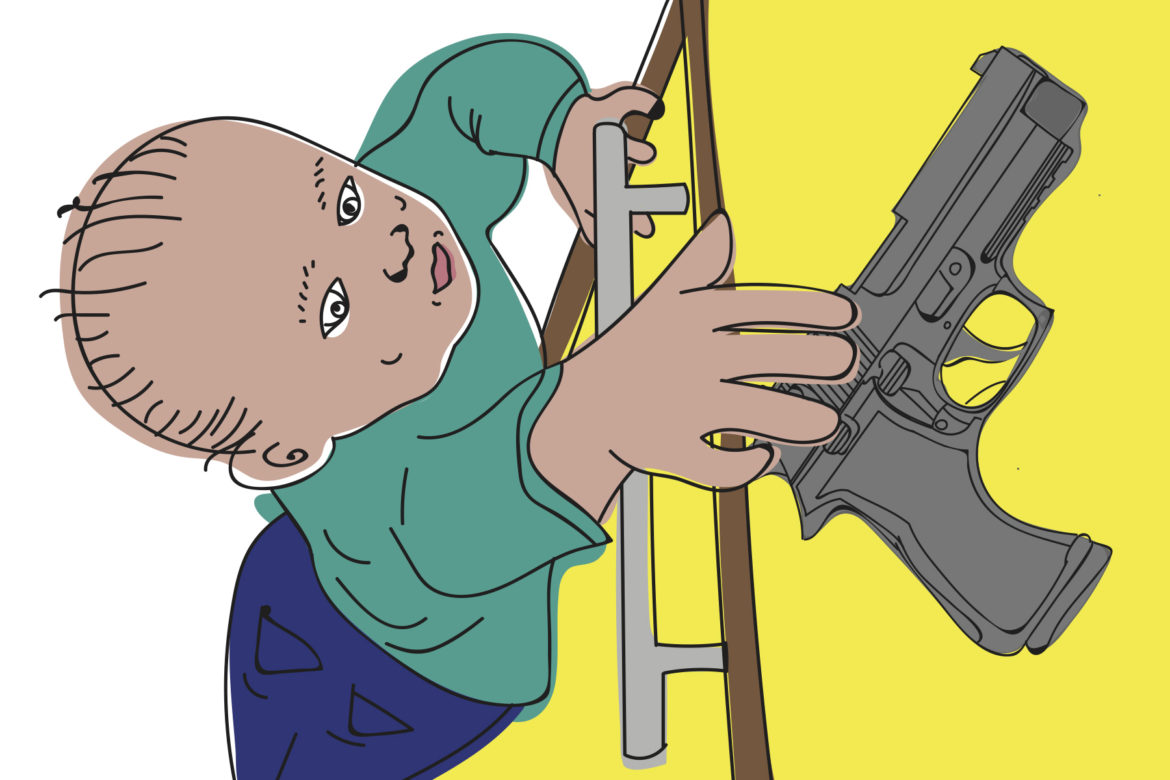A baby reaches for a gun that is on a table in his home, posing an obvious threat to his safety. Without the proper laws to protect children from guns, they are likely to hurt themselves and each other. Illustration by Suncana Pavlic.
Laws that prevent children and teens acquiring guns from home are necessary.
During the Clarke Central High School vs. Cedar Shoals High School varsity football game held at CCHS on Sept. 22, a 13-year-old student was arrested for possessing a gun. According to an article on Online Athens published Sept. 25, it was the second time in four years an incident like this has taken place.
In a November poll of 541 CCHS students, 12 percent said they had seen a student with a gun at school.
It isn’t hard to understand why children and teens shouldn’t have access to guns.
“Research says that the frontal lobe doesn’t really, fully form until the age of 25. The frontal lobe is the part of the brain that’s really involved in planning and thinking ahead and kind of self-monitoring and those types of things,” school psychologist Dr. Marcia Page said. “One thing I think is really hard for teenagers and adolescents is to see the long-term consequences of their actions.”
The fact that guns are floating around the school is just one part of a greater problem.
The issue of accessibility and lack of security comes back to guns in homes. A 2004 study by the U.S. Secret Service and Department of Education states most school shooters use guns they acquired at home or a family member’s home.
43 percent of homeowners with both guns and children in their residence kept at least one gun unlocked, rather than in a gun safe or secure container according to a 2000 study published in the American Journal of Public Health.
The fact that guns are floating around the school is just one part of a greater problem. The real issue is that teens and children can access guns easily.
Children and teens are not prepared to handle an object designed to kill. Yet, many know where to acquire one easily, or live in homes where discovering one is possible.
Lawmakers need to address this at the source. Some state legislatures have already tried with laws that target minors acquiring guns at home, known as Child Access Prevention (CAP) laws. Many states have CAP laws, but they each vary in strength and level of effectiveness.
Georgia’s are some of the weakest, with no penalty for negligently storing a gun. Georgia’s law doesn’t really do anything to prevent children or teens from finding or taking guns from home, compared to CAP laws that do, such as in Massachusetts, where storing a gun unlocked is a felony.
The difference in effectiveness is obvious. From 2014 to 2016, just one child under 12 was accidentally shot in Massachusetts. In Georgia, at least 10 children in the same age range were accidentally shot just in 2015 and 2016 alone.
According to a 2016 study titled, “Child Access Prevention Laws, Youth Gun Carrying, and School Shootings”, “CAP laws are associated with a 13 percent decrease in the rate of past month gun carrying (at school) and an 18 percent decrease in the rate at which students reported being threatened or injured with a weapon on school property.”
Georgia needs stronger CAP laws, making it illegal to leave a gun unlocked and loaded, and holding owners responsible when their guns end up killing children who have easy access to them. It will make it harder for teens to take guns from home. It will help prevent tragedies and make schools safer.
This is a very mild gun law — it doesn’t restrict buying guns, it doesn’t register them or keep track of them, and it doesn’t affect where someone can carry them. All it would do is require gun owners store guns responsibly.
That shouldn’t be too much to ask.
